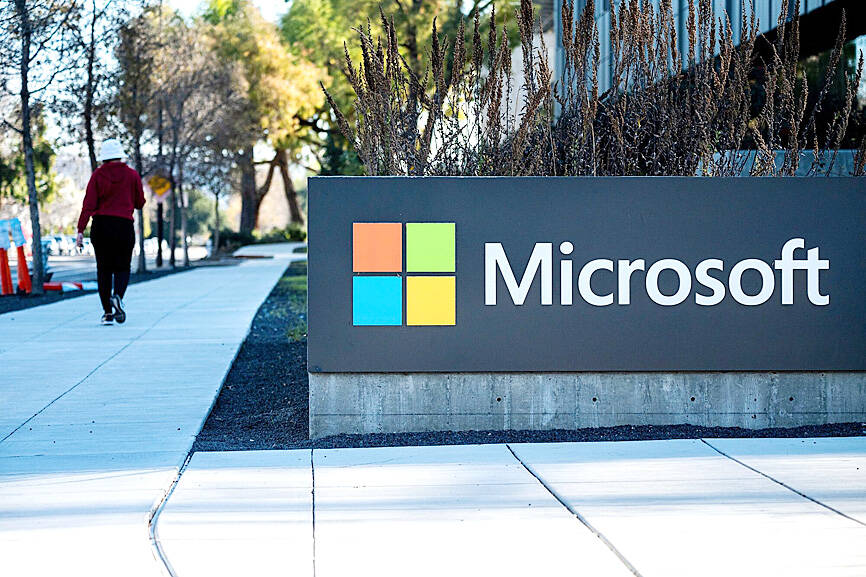Microsoft Corp on Wednesday reported profits of US$24.1 billion in the recently ended quarter, but shares slid on worries over its vital cloud computing business.
Revenue grew 12 percent year-on-year to US$69.6 billion and the amount of money taken in by its “intelligence cloud” unit including its flagship Azure computing platform climbed 19 percent from the same time last year to US$25.5 billion, but the market had expected more.
Microsoft’s productivity business segment, which includes its Office suite of e-mail and other workplace products, saw sales grow 14 percent to US$29.4 billion.

Photo: Bloomberg
Its personal computing business, led by its Windows division, remained steady at US$14.7 billion, with a drop in consumer device sales offset by growth in advertising revenue tied to the Bing search engine.
Microsoft shares dropped 5 percent in after-hours trading on Wednesday, but were still higher than on Monday, when the tech giant was hit by a broader tech stock sale caused by a frenzy over the new ChatGPT competitor developed by Chinese artificial intelligence (AI) start-up DeepSeek (深度求索).
“Microsoft had a fine quarter, but ‘fine’ isn’t what investors want from an AI juggernaut spending like it’s building the Death Star,” Emarketer principal analyst Jeremy Goldman said, referring to a planet-sized space station from the Star Wars films.
“The cloud is still a growth engine, but AI competition — especially from unexpected players like DeepSeek — is real,” Goldman said.
Microsoft chief executive Satya Nadella spotlighted the tech titan’s AI investments, saying the company is “innovating across our tech stack” to unlock the ability for customers to make money from the technology.
Nadella said Microsoft’s AI business is on pace to bring in more than US$13 billion annually, in a near tripling of the rate a year earlier.
The Redmond-based company has been at the forefront of the generative AI revolution, largely thanks to its partnership with OpenAI, the creator of ChatGPT.
The company has rolled out AI features at a furious pace, mainly under its Copilot brand, leaving investors hopeful for a return on investment from the expensive technology.
The company is on track to pump about US$80 billion into AI this fiscal year, Microsoft president Brad Smith wrote in an online post.
Smith contended AI is poised to transform all aspects of life, and it is imperative that the US be the global leader when it comes to the technology, he said.
While DeepSeek said that it was catching up to US tech titans on a fraction of their budget, Nadella downplayed such concerns on an investor call on Wednesday, saying “DeepSeek had some real innovations” and it is good to have efficiency gains and lower prices in AI development because it “means people can consume more and there’ll be more apps written.”
Microsoft also added DeepSeek’s latest AI model to those available on its Azure computing platform on Wednesday.
Additional reporting by AP

Taiwan Semiconductor Manufacturing Co (TSMC, 台積電) last week recorded an increase in the number of shareholders to the highest in almost eight months, despite its share price falling 3.38 percent from the previous week, Taiwan Stock Exchange data released on Saturday showed. As of Friday, TSMC had 1.88 million shareholders, the most since the week of April 25 and an increase of 31,870 from the previous week, the data showed. The number of shareholders jumped despite a drop of NT$50 (US$1.59), or 3.38 percent, in TSMC’s share price from a week earlier to NT$1,430, as investors took profits from their earlier gains

In a high-security Shenzhen laboratory, Chinese scientists have built what Washington has spent years trying to prevent: a prototype of a machine capable of producing the cutting-edge semiconductor chips that power artificial intelligence (AI), smartphones and weapons central to Western military dominance, Reuters has learned. Completed early this year and undergoing testing, the prototype fills nearly an entire factory floor. It was built by a team of former engineers from Dutch semiconductor giant ASML who reverse-engineered the company’s extreme ultraviolet lithography (EUV) machines, according to two people with knowledge of the project. EUV machines sit at the heart of a technological Cold

TAIWAN VALUE CHAIN: Foxtron is to fully own Luxgen following the transaction and it plans to launch a new electric model, the Foxtron Bria, in Taiwan next year Yulon Motor Co (裕隆汽車) yesterday said that its board of directors approved the disposal of its electric vehicle (EV) unit, Luxgen Motor Co (納智捷汽車), to Foxtron Vehicle Technologies Co (鴻華先進) for NT$787.6 million (US$24.98 million). Foxtron, a half-half joint venture between Yulon affiliate Hua-Chuang Automobile Information Technical Center Co (華創車電) and Hon Hai Precision Industry Co (鴻海精密), expects to wrap up the deal in the first quarter of next year. Foxtron would fully own Luxgen following the transaction, including five car distributing companies, outlets and all employees. The deal is subject to the approval of the Fair Trade Commission, Foxtron said. “Foxtron will be

INFLATION CONSIDERATION: The BOJ governor said that it would ‘keep making appropriate decisions’ and would adjust depending on the economy and prices The Bank of Japan (BOJ) yesterday raised its benchmark interest rate to the highest in 30 years and said more increases are in the pipeline if conditions allow, in a sign of growing conviction that it can attain the stable inflation target it has pursued for more than a decade. Bank of Japan Governor Kazuo Ueda’s policy board increased the rate by 0.2 percentage points to 0.75 percent, in a unanimous decision, the bank said in a statement. The central bank cited the rising likelihood of its economic outlook being realized. The rate change was expected by all 50 economists surveyed by Bloomberg. The